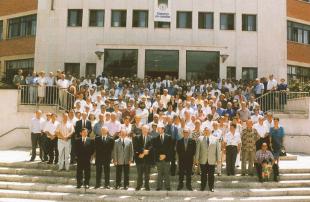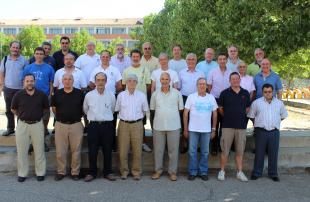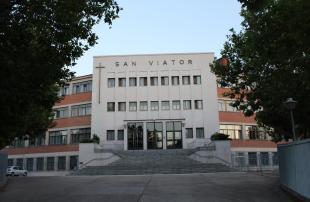Spain



In 1903, the Clerics of St. Viator, like other religious congregations, were forced to leave France in order to survive. Therefore, on July 5, 1903, three Clerics of St. Viator left Rodez (France) for Spain. After intense searches, they were able to settle in Vitoria, Alava, on July 24 of the same year. These French religious were the Brother Teófilo Delmas and Brothers Enrique Amiel and León Valentin.
The Viatorian work expanded in the first third of the 20th century. Small schools were opened in the cities of Asturias, the Basque country and Huesca, with the first new religious, Zarauz, in the ”nursery” in Escoriaza, and since 1921.
The number of Spanish religious was increasing, mixed with other French, who continued to support the works with people and economic means. In 1937 the Spanish Viatorian reality reached a certain autonomy when it was declared “Vice-Province.” It was not until April 18, 1948, that it became the full Province of Spain and walked independently of Rodez, its Mother Province.
Since November 1957, religious of the Province of Spain have been present in Chile. The work is growing and in February 2003 it was already ripe to become an independent province. It has taken many good Viatorians and hard work to reach the reality of the province of Chile after a century.
On April 5, 1980, Easter is another date to be highlighted. A new path began that has led to the current Spanish Viatorian Community.
The province of Spain is composed of 88 religious and 62 associate Viatorians, 110 years after the first Viatorians arrived in Spain, in 1903.
There are 15 Viatorian communities in Spain. Of these 15 communities, in eight live together with religious Viatorians. Five are composed only of religious and two only of associate Viatorians. Our presence is also in Ivory Coast, Japan, Peru and Bolivia with other provinces.
Our pastoral work has traditionally developed through education in schools. There are currently six Viatorian schools: St. Joseph in Basauri (Vizcaya), St. Viator in Huesca, Our Lady of Fatima in Madrid, St. Viator in Valladolid, St. Viator in Madrid and St. Viator in Vitoria-Gasteiz. These last two schools have the complete educational program up to the doors of the University; the other four finish secondary education (up to the age of 16).
Since 1985, our pastoral work has been extended to the parish field. It has grown and today we have parishes in Jutiapa (Honduras), Villaverde (Madrid), Sopuerta (Vizcaya) and we collaborate with the dioceses of Vitoria-Gasteiz and Valladolid. The perspective for the future is to deepen these parish insertions.
Many, especially retired people, are personally committed to the various pastoral, social and welfare tasks. We are also present in the media through our website, personal blogs and periodical publications: VIDA Viatoriana, Viatores por el mundo and Correo Querbes.



